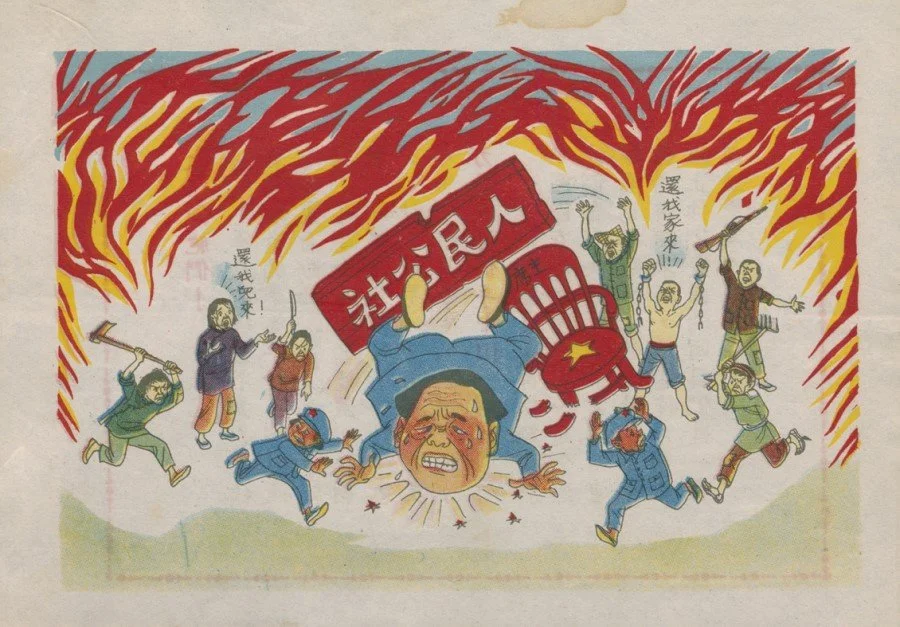Interview with Michael Kerr, assistant chef at the Kuo Yuan restaurant in Willesden 1963-66
01 July 2025, Peking Restaurant, Cambridge
Where were you born?
Michael was born in Kua Chou in South Western China in 1941. His original name was Jeng Dong Koh. When he was very young, his father was sent to Taiwan with the army. He changed his name to Michael Kerr after arriving in England in the 1960s. The names ‘Koh’ and ‘Kerr’ felt sufficiently similar.
Why did you leave your place of birth?
cartoon of the troubles in taiwan, 1950s/60s (source: thinkchina)
In 1948, at the age of 7, Jeng Dong was taken on a difficult journey to Taiwan, to reunite with his father.
He travelled with his uncle and remembers clearly that the journey was 'horrible'. It was long and difficult and he can still recall travelling through a wartorn landscape and experiencing the unavoidable fallout of the Chinese Civil War: injured soldiers and hungry destitute refugees.
Because the war continued in China and the Taiwan Straits, his mother and siblings were unable to leave China to join them and the family remained separated throughout his childhood. He did not reunite with his mother and siblings until 1978 when he was able to bring them to the UK (with the help of his local MP & Margaret Thatcher).
Where did you grow up?
As a boy Jeng Dong lived with his father on a military base and attended the army school. By the age of 20, he was ready to leave Taiwan. For him, the culture was very restrictive and it was clear that he would need to work very hard there ‘for little or no reward’. His father tried to persuade him to join the army but he made other plans.
An opportunity arose on a Merchant Navy ship docked in Taiwan and he signed up to be a sea cadet, travelling to the UK on a Scottish ship. It took five weeks long to travel from Taiwan to the UK by sea.
Before he left Taiwan, he didn’t know very much about the UK. Even though it was tough as a new immigrant and he quickly realised that he didn’t want to become a sea cadet, Michael now jokes that it was a ‘paradise’ compared to the tough life he had known in China and Taiwan.
What was your first job in the UK? Or did you come to study?
A young Jeng Dong arrived in Southampton and briefly attended military school as a cadet. He remembers other cadets who came from Singapore, and the sons of the presidents of Burma and Panama were cadets at the same time as him. He quickly realised that he was not suited to army life, and moved to London to attend technical college in Willesden to study O levels and A levels in Applied and Pure Maths and Physics, with a view to going to university to study Engineering.
About Willesden Technical College (1934-1991) (pictured right): “With the need for local skilled workers, Willesden Technical College opened in 1934 at Denzil Road, off Dudden Hill Lane. The College provided courses formerly taught at the Polytechnic in Kilburn, and also included courses in art and building. In 1964, the College took over the buildings of Dudden Hill Lane school, on the corner of Cooper Road, one of Willesden's wonderful three-decker Board Schools, built in the early 20th century.” Wembley Matters, 18 July 2020
When did you start working at Kuo Yan and how did that come about?
When Jeng Dong was living and studying in Willesden and living on Clifford Gardens, NW10 he needed work to support himself. Through contacts he got a job at Kuo Yan as an assistant to Mr Kuo (pictured below), who was the chef and owner. Once Jeng Dong had settled in London he changed his name to a more anglicised one: Michael Kerr.
What do you remember about the chef and the restaurant? Can you describe the restaurant and the chef? Were other people employed at the restaurant? What do you remember?
Michael recalls that the former Ambassador's chef, Mr Kuo, was a smart and kind man in his 50s. He wore chef whites and was slightly balding, with slicked-back dark hair (right).
Michael learned to cook the speciality dishes by watching Mr Kuo’s techniques and taking small tastes of the food that was served. Mr Kuo did not teach or share his skills - and enouraged Jeng Dong to learn through observation.
The most popular dishes served were Peking duck and duck pancakes and they also served a wide range of other typical dishes. They used mainly English ingredients and bought some Chinese products from Indian-owned shops which were already importing products from Asia.
In the early days the restaurant was small, with a maximum of ten tables and a tiny kitchen. The main restaurant was simply furnished and very low key in terms of decoration. However there were always white tablecloths on the tables.
Mr Kuo was also skilled in Chinese calligraphy and a sign written by Mr Kuo is hung on the wall of Micheal’s restaurant in Cambridge, Peking Restaurant: translated it says 'Respect for Good Cooking'.
‘Respect for good cooking’
Do you know why Willesden was chosen for the restaurant location? What was Willesden like at that time? Do you remember any other shops or businesses?
Michael describes Willesden as being a poor area at this time, with many 'drunk Irishmen' rather than the refined English people he had expected to meet when he left Taiwan.
However the rents were cheap and this suited his student budget - and the restaurant.
Mr Kuo had a strong reputation as a chef and wealthy well-connected people travelled a long way to eat at his restaurant. Michael points out that there was very little competition in London at the time - there were few restaurants and according to Michael, the English food was ‘pretty bad’.
In Willesden, along with the Irish community there were Jewish businesses and Jewish migrants living in the area - but Michael notes they did not come to the restaurant because they only ate kosher food.
Did you live in Willesden area, or close by? Did you live with other chefs? What do you remember?
As a student Michael lived on Clifford Gardens in Willesden. It was a short walk to college and to work.
Do you remember any famous visitors to Kuo Yuan? What is your favourite memory of your time there?
“Giles Coren’s happiest moments as a child were meals with his family at the local Chinese. In an extract from his new book, he explains why no other restaurant has ever matched the joy of prawn toast and spring rolls at the Gourmet Rendezvous”I only know that the owner of the Mandarin, five doors down, is called Michael, and that we don’t go there any more because he likes us too much, and is always trying to give us free things, which is embarrassing.”
Michael doesn’t remember famous faces from his Kuo Yuan days because he was mainly busy cooking backstage in the small kitchen. He remembers it was always busy.
Later when he ran his own restaurant, Mandarin on Finchley Road, he became more attuned to celebrity visitors and vividly recalls the famous chef Ken Lo visiting.
Michael opened Mandarin in 1967 after a brief stint at university.
In the course of our research we discovered writer and broadcaster Alan Coren was a frequent celebrity guest at his restaurant and Michael and his generosity got a cheeky mention (left) in son Giles Coren’s memoir ‘Eating With My Father’ (2012).
What was the Chinese community like when you first came to the UK and how has it changed?
The community was small when he arrived and it has grown. He experienced some mild racism but it never bothered him. He felt a strong affinity with other immigrants - especially Jewish immigrants - when he lived in North London. He says his success in business is linked to an immigrants' drive to do well. His four children grew up in Cambridge and have successful careers in medicine, fashion, art and finance - and are not at all interested in the restaurant business.
As a chef in the 1960s, where did you by Chinese ingredients?
Michael says it was always possible to adapt local ingredients to make Chinese food as the techniques (eg stir fry) made the the available British vegetables taste better. He also recalls that other immigrants had begun to import products from different parts of the globe and it was never difficult to find what was needed.
What did you learn from Kuo Yuan in Willesden?
michael cooking at the peking restaurant, cambridge (july 2025)
At the Peking Restaurant (Cambridge), the menu is extensive but with strong similarities to the traditional Chinese dishes served at Kuo Yuan in the 1960s. Many of the dishes Michael learned to cook under Mr Kuo in Willesden. In fact, the website for the Peking Restaurant proudly says:
“Michael started his career in the illustrious Kuo Yuan restaurant in the early 1960's, under the tutelage of the old Chief Chef of the Chinese Embassy, Mr Kuo.”
Michael moved to Cambridge in 1985 because he was offered a restaurant opportunity there but ended up staying. His business is as much in property as in food now - he owns three restaurants in Cambridge including the Peking Restaurant, and still owns the freehold of the first restaurant he owned at 279c Finchley Road NW3.
At the time we met Michael was 84 years old and thinking of retiring from the restaurant business. He was engaged to be married.





